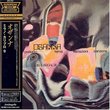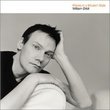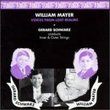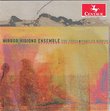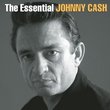| All Artists: George Tsontakis, Todd Palmer, Broyhill Chamber Ensemble, Brian Zeger, Gil Morgenstern Title: Tsontakis: Piano Quartet Trilogy Members Wishing: 0 Total Copies: 0 Label: Koch Int'l Classics Release Date: 11/23/2004 Genre: Classical Styles: Chamber Music, Historical Periods, Classical (c.1770-1830) Number of Discs: 1 SwapaCD Credits: 1 UPC: 099923755029 |
Search - George Tsontakis, Todd Palmer, Broyhill Chamber Ensemble :: Tsontakis: Piano Quartet Trilogy
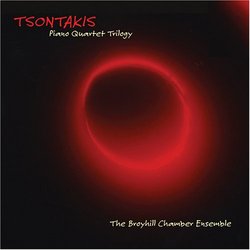 | George Tsontakis, Todd Palmer, Broyhill Chamber Ensemble Tsontakis: Piano Quartet Trilogy Genre: Classical
|
Larger Image |
CD DetailsSimilar CDs
Similarly Requested CDs
|
CD ReviewsFour Extraordinary Works by a Modern American Master J Scott Morrison | Middlebury VT, USA | 03/12/2005 (5 out of 5 stars) "George Tsontakis (1951- ) is a composer whose music I've known for many years because of his long involvement with the Aspen Music Festival which I attend annually. He has finally gotten some real attention and just this past November was awarded the Grawemeyer Award (a prize that carries with it a cash grant of $200,000!) for his Second Violin Concerto. There have been earlier recordings--e.g. String Quartets Nos. 3 & 4 played by the American String Quartet, 'Four Symphonic Quartets' with James dePreist conducting the Monte Carlo Philharmonic, and 'Ghost Variations,' a set of solo piano variations premièred and recorded by Stephen Hough--that deserve one's attention. And now there seems to be a flurry of new recordings, including this one. It consists of three piano quartets, two of them for the usual forces and one in which a clarinet replaces the more usual viola. In addition, on this disc is a solo piano 'Bagatelle,' about which more later. To get an idea of his 'sound' one could do no better than quote the entry in Grove about Tsontakis, written by fellow-composer Eric Moe: 'Tsontakis's early works are written in a dissonant chromatic idiom not unlike that of [his teacher] Sessions. His musical language soon shifted, however, towards a classically-influenced style characterized by large-scaled harmonic prolongations and what he calls "the timeless gesture," a reference to the past through evocation rather than quotation. With the String Quartet No. 3 "Coraggio" (1986) he arrived at an idiosyncratic tonal language propelled by non-minimalist, Beethovenian use of repetition.' The first piano quartet, called 'Bagatelles' (1997), is in three movements--'Moderato,' 'Solemn,' and 'Scorrevole' ('flowing'). Written on commission by the widow of a Korean-American physician, Thomas P.K. Lim, in his memory, and premièred by the the three Lim daughters (and violist Lawrence Dutton of the Emerson String Quartet), there are flitting references in the dreamlike final movement to the Korean folk tune 'Arirang.' The title derives from the intentional reminiscences, by use of tiny Beethovenian motifs, of that master's late piano bagatelles. The mood of the work moves from dark, somber, perhaps mournful tones to a third movement that is informed by a sense of hazy recollection both in its references to music of the past and, seemingly through a scrim of memory, to the man for whom the work was written. The Second Piano Quartet (1998) was commissioned by the group playing it here, the Broyhill Chamber Ensemble (Gil Morgensten, violin; Carol Cook, viola; Darrett Adkins, cello; and Brian Zeger, piano) and premièred at the Cape & Islands Chamber Music Festival (Cape Cod). It is in two movements--'Lazy' and 'Broad'. The long first movement, generally quite slow, slightly jazzy, and even a bit mysterious, is interrupted by an agitated middle section that seems to be trying to become a scherzo incorporating Messiaenic birdsong (primarily in the piano--communication with the composer confirms that these are 'his' birds, those of upstate New York where he lives) but which suddenly disappears back into the initial mood and a morendo ending. The somewhat livelier shorter second movement maintains much of the earlier movement's mysterious tone, a sense of expectancy or longing. It features long-limbed melodies, often with countermelodies, that convey aching loss, underpinned by trenchant piano chords and occasional outbursts of passion. Like many of Tsontakis's pieces, this one ends in a whisper. Here, as in other Tsontakis works, one has the sense of having arrived where music is already in progress and, at the end, leaving it to continue unheard. In the clarinet/piano quartet, titled 'Eclipse' (1995), the Broyhills are joined by clarinetist Todd Palmer, whose velvety tones give the piece its general sound. The clarinet, replacing the viola, is primus inter pares by virtue of its contrasting timbre and the highlighted role Tsontakis gives it. The longest work here--24 minutes--it is in four movements: Haunting; Hyperactive; Serene, yet disturbing; and Scherzo: Maniacal. Dancelike passages are much more in evidence in this work than in its discmates and as the subtitles indicate, at times they are 'hyperactive' or 'maniacal,' not to speak of alternately hysterical, driven, joyful or even drunken. I keep imagining that I hear Greek folk rhythms. (I have absolutely no idea if that's true; I do know, though, that Tsontakis, an American of Cretan background, does occasionally use Greek elements in his works. Be that as it may, I kept picturing Greek folk dancing in my mind's eye.) The 'Serene, yet disturbing' (a seeming contradiction in terms) is accomplished by posing two layers of sound, one serenely slow moving, and the other characterized by anxious tremolos in piano and clarinet; neatly done. The fourth movement ('Maniacal') is, in a word, a demented romp. This is a tremendously attractive work and I understand it has already been recorded by another group. Lagniappe on this disc is the final band, the six minute long 'Bagatelle' (1989, mistakenly listed as 1996 on the jewel box card) for solo piano, played to a fare-the-well by Brian Zeger. It was originally to have been one of a set of piano pieces, but that notion was abandoned because just after it was written Tsontakis got the idea to write what I believe to be a masterwork, his 30-minute-long 'Ghost Variations' so brilliantly recorded by Stephen Hough on Hyperion. 'Bagatelle' is one humdinger of a piece. It is very reminiscent of the 'Ghost Variations' along with echoes of Brahms, Messiaen (birdsong again), and Debussy. Atmospheric, eventful, memory-laden, formally seemingly loose but nonetheless somehow a satisfying whole. I've just in the last few days suggested to two concertizing pianists of my acquaintance that they consider learning it. I like it that much. Tsontakis has a real gift for writing for the piano. This is an extraordinarily satisfying collection of music. I recommend it urgently to anyone desiring to broaden their knowledge of contemporary American chamber music. TT=66:09 Scott Morrison" NY Times Review Penny | New Rochelle | 04/18/2005 (5 out of 5 stars) "Tsontakis: 'Piano Quartet Trilogy'
Broyhill Chamber Ensemble. Koch International Classics KIC-7550; CD. MUCH to its credit, the music of George Tsontakis eludes easy categorization. Born in Queens in 1951, Mr. Tsontakis was influenced as a young man by two formidable teachers, Roger Sessions and Hugo Weisgall. But later neo-Classical and neo-Romantic elements, with hints of jazz and Greek Orthodox sacred music, leavened his heavily dissonant and boldly chromatic style. This disc offers three engrossing chamber works from the 1990's, performed with assurance and imagination by the Broyhill Chamber Ensemble. The first movement of the Piano Quartet No. 2 is called "Lazy," and true to the title, the piano begins with seemingly aimless, thickly chromatic piano chords. Yet the harmonies are so pungent and the chord shifts so sneaky that when a magisterial melody for the cello breaks out, you can't stop listening to those fidgety piano chords. "Eclipse," for clarinet, violin, cello and piano, has a ruminative and eerie opening movement. The surprising second movement, "Hyperactive," is charged with jerky dance rhythms. Its driving energy combines with the tart, hard-edged harmonies to create a frenzy that leaves you reeling. A deceptively serene slow movement follows, but listeners should not relax their guard too long, because the finale is a devilish scherzo thick with pummeling piano chords. In "Bagatelles," another piano quartet, a harmonically lucid and inventively neo-Classical work, Mr. Tsontakis pays homage to the Beethoven bagatelles: "those incredible piano trifles," as he calls them in booklet notes. The disc ends with a short bagatelle for piano, allowing the ensemble's excellent pianist - Brian Zeger, best known as a recital accompanist - a welcome solo turn. This mercurial bagatelle, with delicate piano figurations one moment and dizzying repeated riffs the next, is hardly a trifle. All in all, an impressive recording of vibrant chamber works. ANTHONY TOMMASINI" |

 Track Listings (10) - Disc #1
Track Listings (10) - Disc #1